CS Text Books
This textbook is currently used at CS Education for the students, so it is not available for sale on this website. Students who wish to study with this book are encouraged to enroll in a nearby academy.
Learning at CS Education is set within the framework and expected outcomes of four core subjects: Writing, English, Mathematics and General Ability. The core skills tested within these core subjects are as follows:
- Writing examines student’s Creative Writing
- English examines student’s Reading Skills
- Mathematics examines student’s Mathematical Reasoning Skills
- General Ability examines student’s Thinking Skills
English Elite

Reading Comprehension
Each unit commences with a Reading Strategy to provide students the skills to read and comprehend successfully. Subsequent exercises comprise Reading Comprehension tasks in which students demonstrate their ability to interpret, analyse & evaluate texts with appropriateness, accuracy, confidence, and fluency.
Vocabulary & Grammar
CS Education English lesson books contain language exercises in which students learn the patterns & purposes of the English language including spelling, vocabulary, grammar and punctuation at the word, sentence, and extended writing levels.
Viewing
Today’s literacy skills include interpreting and understanding visual texts. To this end, some of our reading & writing tasks include visuals such as cartoons, graphs, charts & pictures.
Enriching English & Reading Skills
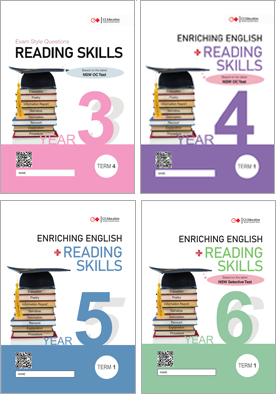
Enriching English & Reading Skills is a complication of challenging enrichment activities designed to inspire more children to study English, to encourage high standards of English and to stimulate creativity with regards to English.
Enriching English & Reading Skills allows children to:
- Enrich English lessons & provide extention materials that will challenge more able students.
- Provide opportunities for students to expand their thinking & inferencing skills through higher order
questions. - Improve students’ ability to self direct their learning.
Literature

Our English lessons incorporate a Literature Section: Novel Study with the aim of engaging students in the study of a literary text which may have personal, cultural, social or aesthetic value to them. Here, students read, interpret, appreciate and respond to the text by answering questions based on it.
Students apply knowledge learned in other interrelated areas to create meaningful texts. They are taught the skills of writing a range of texts and are expected to create similar texts in the course of the term. Further development of the writing skill is done in our Supplementary Writing Course. Here, students are taught how to apply knowledge they have learnt to write with clarity, authority and novelty a range of written texts that entertain, inform and persuade audiences. Students learn how to strategically select key aspects of a topic & language, edit for enhanced meaning and effect by refining ideas, re-ordering sentences, adding or substituting words for clarity and removing repetitions. The learning outcome of this course sees the creation of new texts which are clear, effective, informative and innovative.
Essential Maths

Basid Concepts + Examples + Practice Excercises
Essential Mathematics syllabus identifies essential knowledge, skills and understanding of mathematics. The book is designed taking into account the diverse needs of all student to provide continuity of study and to ensure successful transition through all stages in learning mathematics. It is an invaluable source which will provide the foundation of Mathematics. Students who wish to achieve confidence and success should:
- understand all the basic mathematical concepts and steps taken in each unit.
- practise consistently by applying the mathematical concepts and rules learnt.
- attempt more practice exercises on difficult areas to understand and eliminate errors.
Mental Maths
It is important to develop a child’s mental computation skills from a young age. By teaching them to develop more efficient strategies, students will increase their speed and accuracy, thus helping to make them confident mathematicians. CS Education’s mental maths book will assist students to:
- Practice essential number operations and mathematical facts
- Efficiently recall and use mathematical formulas and rules
- Develop, practice and strengthen mental computation skills
- Become quick, proficient mathematicians by emphasising speed and accuracy
Enrich Maths

Enrich Maths
Enrich Maths is designed to develop and enrich students’ problem-solving skills. It further reinforces students’ mathematical concepts, encourages flexibility of thinking and tackilng challenging problems that will broaden and enrich students’ learning in mathematics. Enrich maths is an excellent material for mathematical development at different levels to meet student interests and also to stimulate student development in other areas of mathematics.
Creative Problem Solvin
Creative Problem Solving is designed to develop and enrich students’ problem solving skills. It is a systematic approach to problem solving which contains challenging and interesting problems at varying levels from all strands of the maths curriculum.
Mathematical Reasoning
CS Education has developed two additional question types that will develop students’ mathematical reasoning skills so that they can excel in mathematics. These are questions involving Data Interpretation and Problem Solving. The specifics are explained below.
Data Interpretation
Interpreting data involves reading and understanding data presented in different forms such as in graphs, charts or tables along with using mathematical reasoning skills to answer questions. It is important to take note of keys, axis and headings to be able to completely and accurately understand and analyse data.
The best thing that students can do is expose themselves to as many different ways of representing data as possible so that they are not caught off-guard and are able to use reasoning skills to interpret any type of visual representation that they are presented with.
Problem Solving
These questions differ from standard math questions in that there is no clear and obvious way in which to solve them. The questions generally contain aspects of more than one question type and require higher order mathematical reasoning skills in order to solve them. As such, students cannot simply rote learn the method for solving these questions and must instead use their mathematical reasoning skills to apply multiple techniques and arrive at the correct answer. Practice is the key to improving with these types of questions, as being exposed to varied question types will help students identify how the techniques they already know can now be applied to harder questions in creative ways. Developing these reasoning skills will broaden student’s mathematical intuition and introduce them to the thrill of discovery, thus fostering their interest in math and aiding brain development.
General Ability
The General Ability (GA) test is also referred to as the General Aptitude or IQ test. The General Ability test is designed to assess the general scholastic aptitude of students and students’ ability to solve problems. It measures general mental abilities by providing an opportunity for students to demonstrate the ability to see relationships and solve problems.

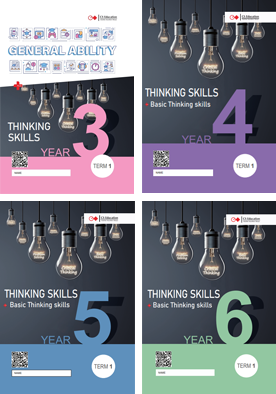
THINKING SKILLS
Critical Thinking
- Finding the Main Conclusion: Students will be required to recognise the core point of a stimulus provided. They will be required to link different ideas into one singular coherent idea which represents the main aim of the passage.
- Applying Principles: Students will be required to read and recognise certain principles provided in a stimulus, extending these to certain scenarios and situations.
- Identifying Inferences and Assumptions: Students will be required to detect instances of inferred statements as well as detect when an assumption has been made in reasoning. They will also be required to discern whether these inferences and assumptions made are correctly made.
- Detecting Reasoning Errors: Students will be required to question reasoning and find flaws in how an argument is constructed.
• Matching Arguments: Students will be required to find the main argument of a stimulus or passage and match statements that support or go against the argument, whilst maintaining its relevance to the information.
Problem Solving
- Relevant Selection: Students will be required to select relevant and important information from a source provided via stimulus, utilising this information to efficiently arrive at a solution.
- Finding Procedures: Students will be required to arrive at their solution from a stimulus by applying numerical skills and concepts to form a pathway to achieving the answer. Their creative interpretations of the skills required and application of such will be examined.
- Identifying Similarities and Patterns: Students will be required to discern between stimuli, comparing and contrasting differences and similarities which can lead them to arrive at the answer to the problem.

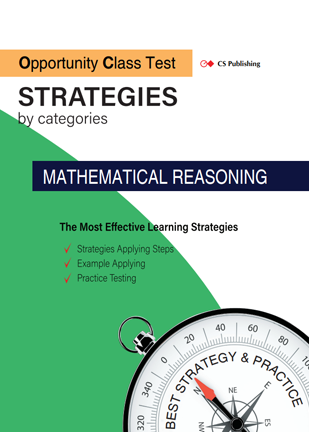
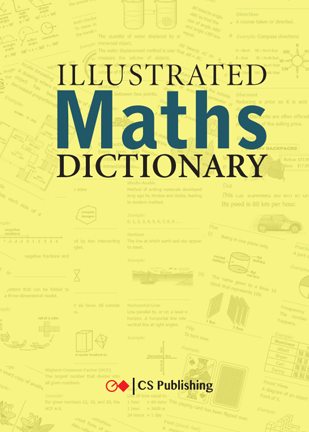
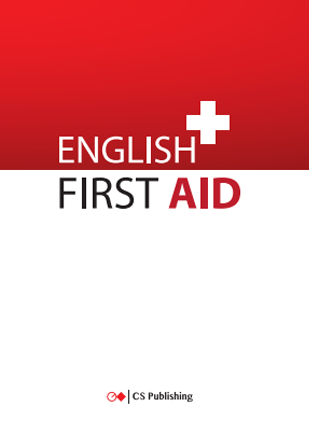
![Thinking Skills [Strategies by categories]](https://csbookshop.com.au/wp-content/uploads/2022/02/thinking-skills-strategy.png)
![Little Prince [Literature series]](https://csbookshop.com.au/wp-content/uploads/2022/02/Little-prince.png)
![Thinking Skills [Strategies by Categories]](https://csbookshop.com.au/wp-content/uploads/2024/10/Thinking_Selective-strategy.png)